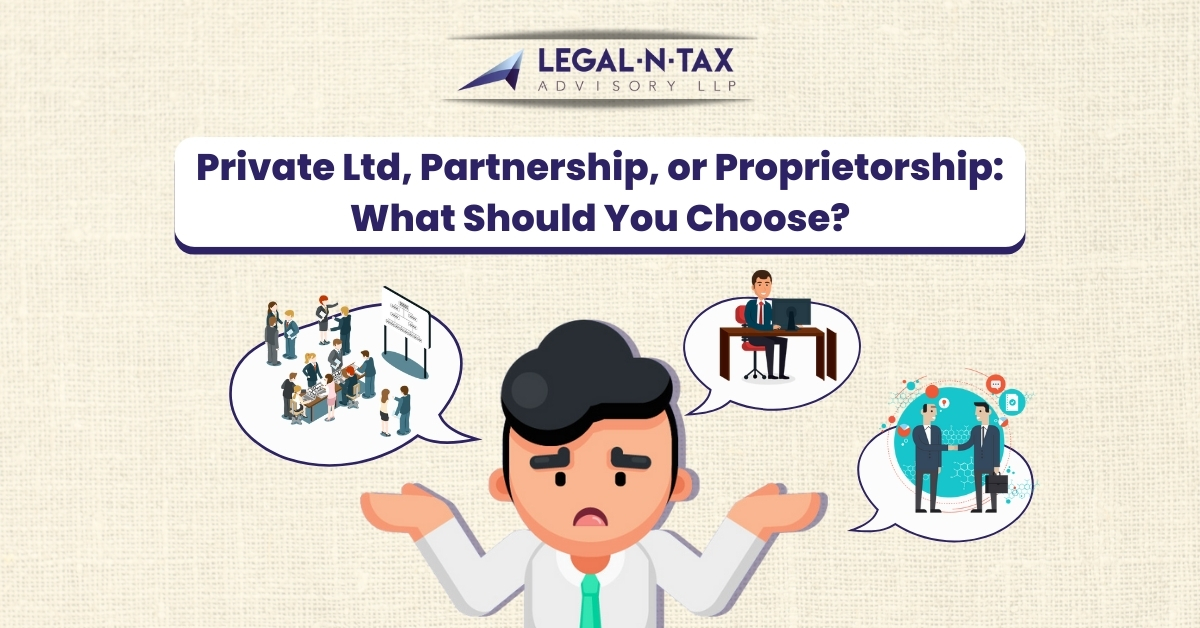Private Ltd, Partnership, or Proprietorship: What Should You Choose?
Business / Jul 11, 2024

When starting a business, one of the crucial decisions you'll face is choosing the right business structure. Your choice will affect your legal responsibilities, tax obligations, and overall management flexibility. The three common structures in India are Private Limited Company, Partnership, and Proprietorship. Let's dive into each option to help you make an informed decision.
1. Private Limited Company
Advantages:
- Limited Liability: Shareholders' liability is limited to their share capital, protecting personal assets.
- Separate Legal Entity: The company is a distinct legal entity, separate from its owners.
- Ease of Raising Capital: Easier to attract investors and secure loans due to structured regulations and credibility.
- Perpetual Succession: The company continues to exist even if shareholders change or pass away.
- Tax Benefits: Various tax exemptions and benefits available under the Income Tax Act.
Disadvantages:
- Complex Formation: Registration involves more formalities and paperwork.
- Regulatory Compliance: Strict regulatory compliance and regular audits are mandatory.
- Costly to Maintain: Higher costs due to legal, administrative, and compliance requirements.
2. Partnership
Advantages:
- Simple Formation: Easy to establish with minimal legal requirements.
- Shared Responsibility: Partners share responsibilities and bring diverse skills to the table.
- Flexibility: Less regulatory burden compared to a Private Limited Company.
- Tax Benefits: Profits are taxed as personal income of the partners, avoiding double taxation.
Disadvantages:
- Unlimited Liability: Partners have unlimited liability, risking personal assets.
- Limited Capital: Raising capital can be challenging as it depends on the partners' contributions.
- Potential for Conflict: Disagreements between partners can affect business operations.
- No Perpetual Succession: The partnership dissolves upon a partner’s death or withdrawal unless otherwise specified.
3. Proprietorship
Advantages:
- Full Control: The owner has complete control over the business decisions.
- Easy to Start: Simple and inexpensive to establish with minimal regulatory requirements.
- Tax Benefits: Income is taxed as personal income, simplifying tax filing.
- Direct Profits: The owner receives all the profits generated by the business.
Disadvantages:
- Unlimited Liability: The owner is personally liable for all debts and obligations, risking personal assets.
- Limited Resources: Raising capital and expansion can be challenging with limited funds.
- Lonely at the Top: All responsibilities fall on the owner, leading to potential burnout.
- No Perpetual Succession: The business ceases to exist upon the owner’s death or incapacity.
Choosing the Right Structure
When deciding which business structure to choose, consider the following factors:
- Business Goals: Long-term vision and growth plans for your business.
- Risk Tolerance: Willingness to assume personal liability versus limited liability.
- Capital Needs: Ability to raise funds and attract investors.
- Control: Desire for sole control versus shared decision-making.
- Regulatory Compliance: Readiness to adhere to regulatory requirements and compliance.
- Tax Implications: Understanding the tax liabilities and benefits associated with each structure.
Conclusion
Choosing the right business structure is a pivotal decision that can influence your business's success and sustainability. A Private Limited Company offers limited liability and growth potential but comes with higher compliance costs. A Partnership provides shared responsibilities but risks unlimited liability. A Proprietorship offers simplicity and full control but may face challenges in raising capital and assumes personal liability.
Share this with others:

